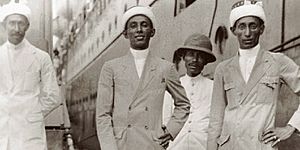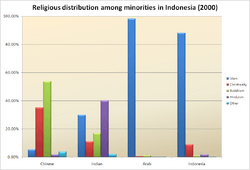Arab Indonesians facts for kids

Hadhrami immigrants in Dutch East Indies
|
|
| Total population | |
|---|---|
|
|
| Regions with significant populations | |
| North Sumatra, Aceh, West Sumatra, South Sumatra, Jakarta, West Java, South Kalimantan | |
| Languages | |
| Indonesian, Arabic, Indonesian regional languages | |
| Religion | |
| mostly Sunni Islam with small Shia minority | |
| Related ethnic groups | |
| Hadhramis, Arab Singaporeans, Arab Malaysians, Arab diaspora |
Arab Indonesians are people who are citizens of Indonesia. They have Arab roots, mostly from a region called Hadhramaut in Yemen. Many of them came to Indonesia a long time ago.
Until 1919, they lived under special rules set by the Dutch East Indies government. Over time, some Arab Indonesians became very successful. They built wealth by investing in real estate and trading goods. Today, most Arab Indonesians live on the islands of Java and Sumatra. Almost all of them follow the Muslim faith.
Contents
History of Arab Indonesians
Indonesia and the Arab world have been connected for many centuries. This connection started even before Islam became widespread in Indonesia. Most of this early contact was through spice traders.
Early Settlements and Dutch Rule
The first Arab settlements in Indonesia might have begun as early as the 5th century. These early communities often blended in with the local cultures. Some groups disappeared, while others became part of the local people.
Modern Arab Indonesians are mostly descendants of Hadramis. They arrived in Indonesia during the time of Dutch colonial rule. Often, the Arab men married local women. The Dutch government saw them as "foreigners from the East." This was similar to how they viewed Chinese Indonesians.
These rules limited where Arab Indonesians could live and which schools they could attend. They were only allowed to live in special areas called kampung Arab (Arab villages). These restrictions were removed in 1919.
Building Influence and Identity
Wealthy Arab Indonesians started to gain economic power. They did this through trade and buying land. They bought a lot of property in cities like Batavia (now Jakarta) and Singapore. Arab Indonesians also did a lot of charity work. They helped build and protect their community connections.
Eventually, some Arab Indonesians joined the Volksraad. This was a council that advised the Dutch East Indies government.
During the Indonesian National Awakening, Arab Indonesians began to form their own groups. They wanted to stand up for their rights. In 1913, organizations just for Arab Indonesians were created. These groups often saw the Arabian Peninsula as their original home. In 1934, Abdurrahman Baswedan started a movement called Persatoean Arab Indonesia. This group promoted Arab Indonesian nationalism.
Some people like Azyumardi Azra have said that Arab Indonesians wanted to make Indonesian Islam more traditional. They aimed to remove local customs from religious practices.
Identity
Arab Indonesians who were born in the Arabian Peninsula are called wulāytī or totok. They are a small part of the Arab Indonesian population. Most Arab Indonesians are called muwallad. This means they were born in Indonesia and might have mixed heritage.
Distribution
Most Arab Indonesians live on the island of Java. Many of them are found in East Java. Some also live in South Sumatra.
Religion
Almost all Arab Indonesians are Muslim. The 2000 census showed that 98.27 percent of Arab Indonesians were Muslim. This is higher than the 88.22 percent for the whole Indonesian population.
Historically, many lived near mosques in areas called kauman. However, this has changed in recent years. Most Arab Indonesians are Sunni Muslims. They often follow the Shafi`i school of Islamic law. A growing number of them are Shia Muslims. Children often attend religious schools called madrasahs.
The Islam practiced by Arab Indonesians is often seen as more traditional. It is different from some local forms of Islam that have more indigenous influences. Many Arab Indonesians encourage other Muslims to follow a more traditional form of Islam.
Notable Arab Indonesians
- Ali Alatas, a former Minister of Foreign Affairs
- Abdurrahman Baswedan, who founded Persatoean Arab-Indonesia
- Abu Bakar Bashir, a religious leader
Images for kids
-
The Ampel Mosque at the end of a shopping street in the Arab quarter of Surabaya, January 14, 1927
-
Women of Hadhrami descent in Palembang in 1940s
-
Kapitan Arab in Borneo
-
Arab Indonesian from Surabaya
-
An Arab Indonesian working on batik wax stamps to work in Tanah Abang
-
hadrami People on Eid al-Adha day in Palembang, February 1937 CE
 | Chris Smalls |
 | Fred Hampton |
 | Ralph Abernathy |














